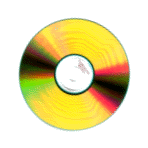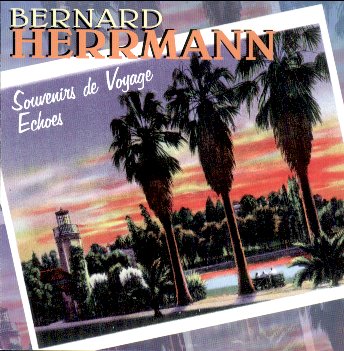Music Webmaster Len Mullenger |
||
Music Webmaster Len Mullenger |
||
 |
FILM MUSIC RECORDINGS REVIEWS |
 |
October 1998
| Discs on these pages are offered for sale. There is also a page of search engines from a selection of on-line retailers here. Please support this web-site |
Bernard HERRMANN
Souvenirs de Voyage*. Echoes**  * Lyric Quartet, Houston with Nancy Weems (clarinet); ** The Texas Festival
Quartet
* Lyric Quartet, Houston with Nancy Weems (clarinet); ** The Texas Festival
Quartet |
|
|
 VARÈSE SARABANDE
VSD-5559 VARÈSE SARABANDE
VSD-5559 |
Crotchet (UK) |

Bernard Herrmann's film music for Vertigo and Psycho strongly
influences these two chamber works. You can detect warmer Vertigo
influences in Souvenirs de Voyage, for string quartet and strings,
(a phantom piano player has crept into the credits on the back liner paper
of the CD) which was written in January 1967. Like his earlier string quartet,
Echoes, it is tinged with melancholy although its romanticism and
tonal colours are much warmer. The change was probably due to improving
relationships - professionally with Truffaut and personally with his third
wife, Norma Shepherd. Souvenirs was inspired, in part, by A.E. Houseman's
poem "On Wenlock Edge the wood's in trouble" (from A Shropshire Lad). Herrmann's
response is suggestive rather than the literal interpretation of Vaughan
Williams, but Herrmann vividly depicts saplings bent double in the gale.
Vaughan Williams is recollected in the second Berceuse through his Riders
to the Sea for the scene now shifts to the Aran Islands off the west
coast of Ireland. Herrmann uses swaying, dreamlike string rhythms and sighing
clarinet appoggiaturas suggesting heaving waves. The final Andante tranquillo
is lusher and more romantic for its inspiration was Turner's Venetian
watercolours.
Echoes was written in 1965 after Herrmann had become unpopular in Hollywood. He was at a low ebb and as he said, of this string quartet, Echoes was "a series of nostalgic emotional remembrances". It is a darker work; bleak and confessional. As Steven C. Smith says in his biography of Herrmann, "While many of its memories remain private (making Echoes, in an unassuming way, Herrmann's own Enigma Variations), others can be guessed by allusions to past works...The origins of the Allegro are unmistakeable: the plucked signature of its opening is Psycho's violent prelude, the crying violin harmonics of its coda, Vertigo's lost Madeleine."
There are a number of recordings of both these works in the catalogue but these are fine sensitive readings.
Ian Lace
Return to October Film Music Reviews